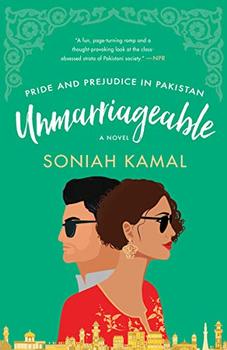Summary | Excerpt | Reviews | Beyond the Book | Readalikes | Genres & Themes | Author Bio

Chapter 1
It is a truth universally acknowledged that a girl can go from pauper to princess or princess to pauper in the mere seconds it takes for her to accept a proposal.
When Alysba Binat began working at age twenty as the English-literature teacher at the British School of Dilipabad, she had thought it would be a temporary solution to the sudden turn of fortune that had seen Mr. Barkat "Bark" Binat and Mrs. Khushboo "Pinkie" Binat and their five daughters—Jenazba, Alysba, Marizba, Qittyara, and Lady—move from big-city Lahore to backwater Dilipabad. But here she was, ten years later, thirty years old, and still in the job she'd grown to love despite its challenges. Her new batch of ninth-graders was starting Pride and Prejudice, and their first homework had been to rewrite the opening sentence of Jane Austen's novel, always a fun activity and a good way for her to get to know her students better.
After Alys took attendance, she opened a fresh box of multicolored chalks and invited the girls to share their sentences on the blackboard. The first to jump up was Rose-Nama, a crusader for duty and decorum, and one of the more trying students. Rose-Nama deliberately bypassed the colored chalks for a plain white one, and Alys braced herself for a reimagined sentence exulting a traditional life—marriage, children, death. As soon as Rose-Nama ended with mere seconds it takes for her to accept a proposal, the class erupted into cheers, for it was true: A ring did possess magical powers to transform into pauper or princess. Rose-Nama gave a curtsy and, glancing defiantly at Alys, returned to her desk.
"Good job," Alys said. "Who wants to go next?"
As hands shot up, she glanced affectionately at the girls at their wooden desks, their winter uniforms impeccably washed and pressed by dhobis and maids, their long braids (for good girls did not get a boyish cut like Alys's) draped over their books, and she wondered who they'd end up becoming by the end of high school. She recalled herself at their age—an eager-to-learn though ultimately naïve Ms. Know-It-All.
"Miss Alys, me me me," the class clown said, pumping her hand energetically.
Alys nodded, and the girl selected a blue chalk and began to write.
It is a truth universally acknowledged that a young girl in possession of a pretty face, a fair complexion, a slim figure, and good height is not going to happily settle for a very ugly husband if he doesn't have enough money, unless she has the most incredible bad luck (which my cousin does).
The class exploded into laughter and Alys smiled too.
"My cousin's biggest complaint," the girl said, her eyes twinkling, "is that he's so hairy. Miss Alys, how is it fair that girls are expected to wax everywhere but boys can be as hairy as gorillas?"
"Double standards," Alys said.
"Oof," Rose-Nama said. "Which girl wants a mustache and a hairy back? I don't."
A chorus of, I don'ts filled the room, and Alys was glad to see all the class energized and participating.
"I don't either," Alys said complacently, "but the issue is that women don't seem to have a choice that is free from judgment."
"Miss Alys," called out a popular girl. "Can I go next?"
It is unfortunately not a truth universally acknowledged that it is better to be alone than to have fake friendships.
As soon as she finished the sentence, the popular girl tossed the pink chalk into the box and glared at another girl across the room. Great, Alys thought, as she told her to sit down; they'd still not made up. Alys was known as the teacher you could go to with any issue and not be busted, and both girls had come to her separately, having quarreled over whether one could have only one best friend. Ten years ago, Alys would have panicked at such disruptions. Now she barely blinked. Also, being one of five sisters had its perks, for it was good preparation for handling classes full of feisty girls.
Excerpted from Unmarriageable by Soniah Kamal. Copyright © 2019 by Soniah Kamal. All rights reserved. No part of this excerpt may be reproduced or reprinted without permission in writing from the publisher.
Your guide toexceptional books
BookBrowse seeks out and recommends the best in contemporary fiction and nonfiction—books that not only engage and entertain but also deepen our understanding of ourselves and the world around us.